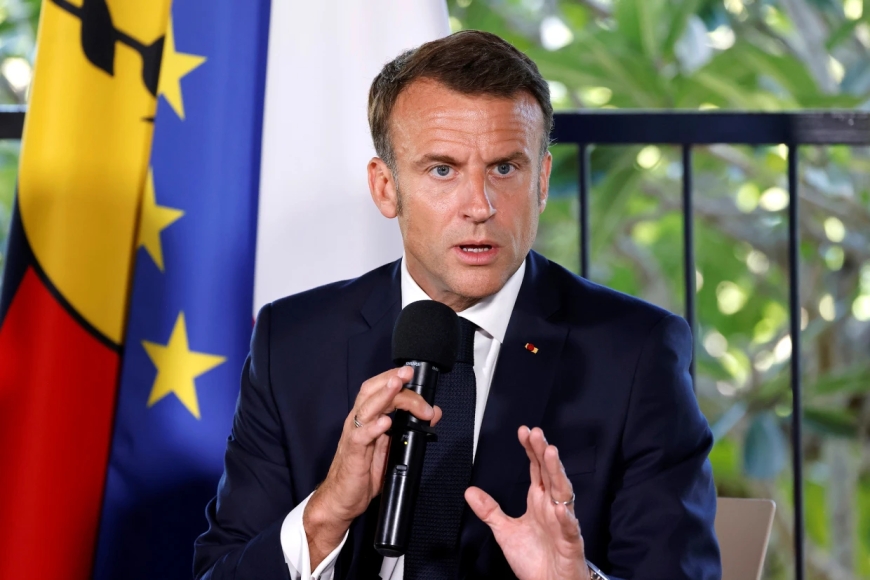Struggle Against Colonial French Rule; New Caledonia Residents Fear Sharing the Fate of Palestinians
Reactions in New Caledonia to the French Government's Proposal of New Voting Rules Have Led to the Deadliest Violence in This French Pacific Territory Since the 1980s. Recent events have exposed long-standing tensions between indigenous peoples, descendants of colonizers, and immigrants in New Caledonia.

Reactions in New Caledonia to the French Government's Proposal of New Voting Rules Have Led to the Deadliest Violence in This French Pacific Territory Since the 1980s. Recent events have exposed long-standing tensions between indigenous peoples, descendants of colonizers, and immigrants in New Caledonia.
Large-scale protests began following changes to the French parliament for regional elections in New Caledonia, granting voting rights to French people who have lived in the region for 10 years or more.
Where is New Caledonia?
New Caledonia is one of five natural resource-rich Pacific islands controlled by France and is at the center of President Emmanuel Macron's plan to increase Paris's influence in the Pacific. With a population of just over 300,000, the territory lies between Australia and Fiji and is one of France's largest overseas territories and a key part of Paris's claim as a power in the Pacific. However, the indigenous Kanak people have long been opposed to French colonialism and have fought to change the status of their land.
In fact, after France took over the region in 1853, Paris deliberately populated the area with French citizens. Therefore, tensions over independence from France have long existed in New Caledonia.
Why is New Caledonia Important for France?
France, which is increasingly losing influence in its former colonies in Africa, sees maintaining a strong foothold in New Caledonia and other overseas territories in the wider Indo-Pacific region as key to its broader plan to maintain its sphere of influence in the region. In addition to ensuring French companies maintain a strong presence in the region and access to key shipping lanes, Paris sees itself as a balancing force in managing tensions between China and the United States, particularly over Taiwan and the South China Sea, and positions itself with a permanent military presence.
Polynesia, Wallis and Futuna, and Clipperton are other French overseas territories in the Pacific, while Mayotte and Reunion are a few of the other territories in the Indian Ocean. The total population of these regions is 1.65 million.
The people of New Caledonia oppose French expansionism, which aims to change the constitution in favor of this European country, and these deadly protests continue with increasing momentum.
For decades, tensions have persisted between Kanaks seeking independence and descendants of colonists who want the region to remain part of France. The aim of the changes to electoral laws was explained as increasing the number of voters for regional elections in New Caledonia, but this was condemned by the pro-independence movement.
A senior sociology professor at the university said: "There is a general sense of anger and injustice. There is also a fear of the Kanak population disappearing or being wiped out by the growth of other populations."
One of the protest leaders in New Caledonia argues that if there is violence in the country now, it is a response to the violence that has been imposed on this land from the colonial period until today.
Colony is not a thing of the past for the young people of the New Caledonian archipelago. They see France as an actor taking away their opportunities.
The violence of the protests in New Caledonia, which caused many casualties, prompted the French president to declare a state of emergency in the region.
As previously mentioned, New Caledonia became a French colony in the 1860s. An uprising against the French colony took place for the first time in 1878, resulting in the deaths of at least 800 people and the exile of thousands of Kanaks. Following this uprising, some indigenous tribes were wiped off the map.
French authorities always promised to grant autonomy to New Caledonia, but all these promises eventually led to violent suppression of protests and demands.
Eventually, France signed an agreement with New Caledonia in 1998 outlining a 20-year anti-colonial process, and this agreement received the support of the region's population.
After all, New Caledonia, which is rich in nickel and could have been an Eldorado for France, has now become a ticking time bomb for Paris. New Caledonia has 30% of the world's nickel reserves, which is an important raw material used in the production of stainless steel and is also found in batteries used in electronic devices.
According to the 2019 census, more than 41% of New Caledonia's population is Kanak and 24% is European. The first group faces more socioeconomic challenges, such as lower wages and higher poverty rates. The French nickel agreement is viewed by the Kanak people as a colonialist agreement.













































